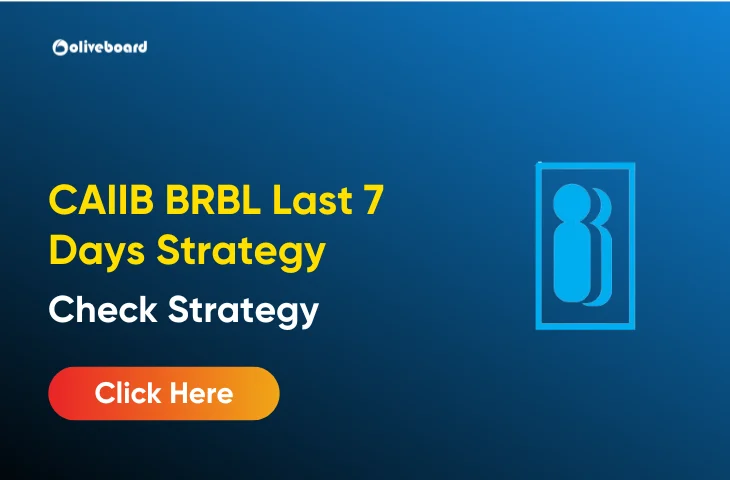CAIIB BRBL Last 7 Days Strategy
The CAIIB BRBL Last 7 Days Strategy 2024 is important for aspirants aiming to ace the Banking Regulation & Business Laws (BRBL) paper in the CAIIB exam. In the final days leading up to the exam, a well-structured strategy can help you revise efficiently and boost your confidence. This article provides a comprehensive plan for the last 7 days before the CAIIB BRBL exam.
Understanding the Importance of CAIIB BRBL
The BRBL paper is one of the four papers in the CAIIB exam, focusing on banking regulations and laws. With a weightage of 100 marks, this subject is pivotal for all banking professionals aiming to improve their knowledge of banking operations, policies, and legal frameworks. Effective preparation for this paper will ensure that you not only clear the exam but also strengthen your expertise in crucial banking laws.
Key Topics to Focus on During the Last 7 Days
In the last week before the exam, it is important to prioritize the most important topics and revise them thoroughly. The CAIIB BRBL syllabus is vast, but you should focus on the following areas:
1. Indian Contract Act, 1872
- Key Sections and their Application
- Contract Formation and Types
- Breach of Contract and Remedies
2. Negotiable Instruments Act, 1881
- Promissory Notes, Bills of Exchange, and Cheques
- Negotiation and Transfer of Instruments
- Dishonor and Legal Provisions
3. Banking Regulation Act, 1949
- Regulatory Framework for Banks
- Functions and Powers of RBI
- Banking Companies and Control over them
4. Consumer Protection Act, 2019
- Rights of Consumers
- Redressal Mechanism and Dispute Resolution
5. Other Relevant Acts
- SARFAESI Act, 2002
- The Payment and Settlement Systems Act, 2007
CAIIB BRBL Last 7 Days Strategy 2024
The final 7 days before the exam are critical. Here is how you can structure your preparation for maximum effectiveness:
Day 1-3: Revise Core Concepts
Start with a strong revision of core topics that carry significant weight in the BRBL exam. Focus on understanding the legal frameworks of key banking laws.
- Indian Contract Act, 1872: Study essential sections and case studies related to contract formation, performance, and breach.
- Negotiable Instruments Act, 1881: Focus on the definition, features, and dishonor of negotiable instruments.
Day 4-5: Practice and Application
The next two days should focus on applying your knowledge. Use the following strategies:
- Mock Tests: Attempt at least two full-length BRBL mock tests. This will help you assess your preparation, identify weak areas, and practice time management.
- Case Studies: Read through case studies related to banking regulations. Focus on understanding the practical application of various laws in banking operations.
Day 6: Focus on Legal Terms and Definitions
On Day 6, concentrate on revising important legal terms, definitions, and their significance in the banking industry. Prepare flashcards or a short summary of key terms.
- Example terms: “Breach of contract”, “Dishonor of cheque”, “Legal tender”, “Banking company”, and more.
Day 7: Final Revision and Relaxation
The final day should be used for a brief review and mental relaxation. Do the following:
- Quick Recap: Go over the summaries and formulas you’ve made during the past six days.
- Revise Key Acts: Make sure you go over the critical sections from each act.
- Stay Calm: Keep a positive mindset, avoid studying new topics, and relax before the exam.
Also Check, CAIIB BRBL Syllabus
Tips for the Last Week Preparation
Here are some additional tips to ensure your preparation is on track for the CAIIB BRBL exam:
- Consistency is Key: Even during the last week, try to stick to your timetable. Consistent revision will help reinforce concepts.
- Stay Updated: Be aware of any recent amendments to banking regulations and laws.
- Group Studies: If possible, engage in group study sessions with peers. This will help in clearing doubts and improving understanding.
- Mind Maps: Create mind maps or short notes to quickly revise concepts like the Indian Contract Act and the Banking Regulation Act.
Effective Time Management for the Last 7 Days
Time management plays a vital role in the final week of preparation. Here is how you can divide your study time effectively:
| Day | Focus Area | Study Time (in hours) |
| Day 1-3 | Core Concepts (Acts and Sections) | 4 hours/day |
| Day 4-5 | Practice (Mock Tests, Case Studies) | 5 hours/day |
| Day 6 | Legal Terms and Definitions | 3 hours |
| Day 7 | Final Revision and Relaxation | 2-3 hours |
Also Check, CAIIB BRBL Questions with Detailed Solutions
Common Mistakes to Avoid in the Last Week
As you prepare for the CAIIB BRBL exam, avoid making the following mistakes:
- Last-Minute Rush: Don’t attempt to learn new topics in the last week. Focus only on revision and strengthening existing knowledge.
- Over-Studying: Rest is equally important as studying. Make sure to get enough sleep to remain sharp during the exam.
- Neglecting Weak Areas: If there’s a topic you struggle with, focus on revising it once more. Don’t leave it for the last minute.
- Ignoring Mock Tests: Mock tests are essential to get familiar with the exam pattern and time management.
Resources for CAIIB BRBL Preparation
To maximize your CAIIB BRBL preparation, make use of the following resources:
- Textbooks and Study Guides: Use the CAIIB BRBL books and resources published by IIBF (Indian Institute of Banking & Finance).
- CAIIB Mock Tests: Take advantage of online mock tests and previous year’s question papers.
- Mobile Apps: There are several apps that offer quick revision material, flashcards, and quizzes for CAIIB BRBL.
Also Check, Tips to score 90+ marks in CAIIB BRBL
CAIIB BRBL Syllabus – In Detailed
The CAIIB BRBL Syllabus is a key part of the Certified Associate of Indian Institute of Bankers (CAIIB) exam, designed for banking professionals. The Banking Regulations and Business Laws (BRBL) paper focuses on the legal and regulatory framework that governs banking operations.
Module A – Regulations & Compliance
- Legal Framework of Regulation of Banks
- Covers laws like the Reserve Bank of India Act, 1934, and Banking Regulation Act, 1949, and how they regulate banks.
- Explains RBI’s role as a central bank and how banks and non-banking financial companies (NBFCs) are regulated.
- Control over Organisation of Banks
- Talks about how banks are licensed, their paid-up capital, and reserves.
- Discusses the role of the board of directors and corporate governance in banks.
- Regulation of Banking Business
- Focuses on RBI’s powers to issue directions to banks on deposits, loans, interest rates, and internet banking.
- Covers the role of the Banking Ombudsman and regulations for financial stability.
- Returns, Inspection, Winding Up, Mergers & Acquisitions
- Covers annual audits, inspections, mergers, and winding up of banks.
- Explains penalties for violations and the processes for mergers and acquisitions.
- Non-Banking Financial Companies (NBFCs)
- Talks about the regulations governing NBFCs and their role in promoting growth.
- Includes guidelines for capital, corporate governance, and co-lending by banks and NBFCs.
Module B – Important Laws/Acts & Legal Aspects of Banking Operations (Part A)
- The Prevention of Money Laundering Act, 2002
- Covers the offence of money laundering, punishments, and obligations of banks and financial institutions.
- Explains the due diligence required and record-keeping procedures.
- Negotiable Instruments Act, 1881
- Discusses negotiable instruments like cheques, their characteristics, and protections for bankers and customers.
- Foreign Exchange Management Act, 1999
- Explains the management of foreign exchange, RBI’s powers, penalties, and enforcement related to foreign exchange laws.
- Payment & Settlement Systems Act, 2007
- Covers the regulation and supervision of payment systems by RBI, including settlement and netting.
- Securities and Modes of Charge
- Discusses various forms of charge like mortgage, pledge, and hypothecation in banking operations.
Module C – Important Laws/Acts & Legal Aspects of Banking Operations (Part B)
- Reserve Bank – Integrated Ombudsman Scheme, 2021
- Explains the procedure for filing complaints and the role of the Ombudsman in resolving banking grievances.
- The Micro, Small and Medium Enterprises Development Act, 2006
- Covers the provisions for micro and small enterprises, delayed payments, and the facilitation council.
- SARFAESI Act, 2002
- Talks about the law that allows banks to recover debts through the sale of secured assets.
- Enforcement of Security Interest
- Explains how banks can enforce security interests and the process for recovering secured debt.
- The Insolvency and Bankruptcy Code, 2016
- Covers the process of insolvency resolution for companies and entities, including timelines and liquidation.
- The Recovery of Debts and Bankruptcy Act, 1993
- Explains how banks recover debts through tribunals and the legal framework for debt recovery.
Module D – Commercial & Other Laws with Reference to Banking Operations
- Essentials of a Contract
- Explains what makes a contract valid and how banking contracts work.
- Contracts of Indemnity and Guarantee
- Discusses the rights and liabilities in contracts of indemnity and guarantees.
- Contracts of Bailment and Pledge
- Covers the legal aspects of loan security, including the pledge of goods.
- Partnership Laws
- Explains the nature of partnerships, the duties and rights of partners, and the impact on banking operations.
- Consumer Protection Act, 2019
- Discusses consumer rights in banking, how disputes are resolved, and the role of consumer protection authorities.
- Tax Laws
- Covers the basics of income tax, GST, and commodity transaction tax related to banking.
Conclusion
The CAIIB BRBL Last 7 Days Strategy 2024 is designed to help you manage your time efficiently, revise essential topics, and approach the exam with confidence. By following this strategy, focusing on core topics, and staying calm during the final days, you will be well-prepared to tackle the exam and boost your chances of success.
CAIIB BRBL Last 7 Days Strategy – FAQs
Ans. Focus on revising key concepts, practicing mock tests, and reviewing important laws and regulations.
Ans. Prioritize Banking Regulations, Prevention of Money Laundering, and Negotiable Instruments Act.
Ans. Break down the laws into smaller sections and focus on understanding their key principles and applications.
Ans. No, focus on high-weightage topics and areas where you feel less confident.
Ans. Take timed mock tests, review incorrect answers, and focus on frequently asked question types.
Ans. Refer to concise notes and explanations, and practice those areas repeatedly.
- Indian Bank Recruitment 2025 Out for 1500 Apprentice Posts

- Indian Bank Apprentice Salary 2025, Pay Scale, Salary Structure

- Indian Bank Apprentice Syllabus & Exam Pattern 2025, Check Details

- Railway RPF Syllabus 2024, Check Exam Pattern, Topic And Syllabus

- SSC JE vs RRB JE, Which Is Better? Know Detailed Comparison

- SSC CGL Study Plan 2025 For Next 25 Days With Tips, Tricks


Hello there! I’m a dedicated Government Job aspirant turned passionate writer & content marketer. My blogs are a one-stop destination for accurate and comprehensive information on exams like Regulatory Bodies, Banking, SSC, State PSCs, and more. I’m on a mission to provide you with all the details you need, conveniently in one place. When I’m not writing and marketing, you’ll find me happily experimenting in the kitchen, cooking up delightful treats. Join me on this journey of knowledge and flavors!
